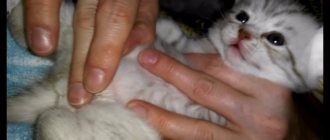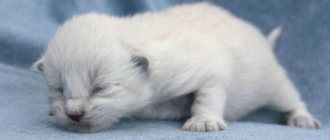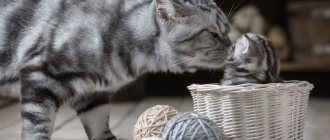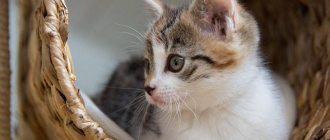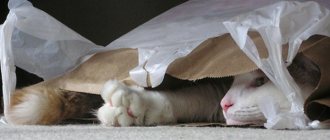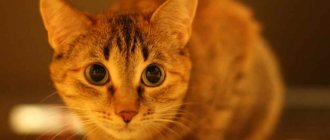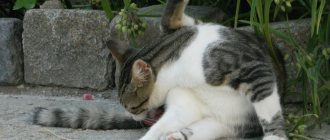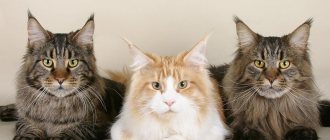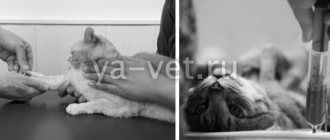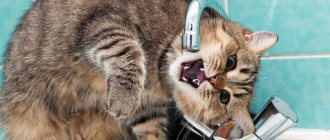Why do cats have diarrhea from dry food?
Each cat has its own characteristics, and while some cats can tolerate all foods, for others, switching to a new dry food can cause intestinal disorders and diarrhea. Let's look at the reasons why cats may develop diarrhea from dry food:
- Dry food may not be suitable for your cat's age; you should read the instructions on the packaging.
- Individual intolerance. Dry food may contain substances to which the cat is allergic.
- Overeating often leads to disruption of the digestive tract.
- Expired dry food. Expired products develop fungi that cause intoxication and diarrhea in cats.
Loose stools can also occur from habitual dry food that has been consumed for a long time. This can be facilitated by:
Dry food is very convenient to use. I poured it in and that’s it. No need to waste time cooking or cutting meat or fish. In addition, dry food is developed taking into account the characteristics of each animal; it contains vitamins and minerals necessary for normal life. Dry food, especially economy class, has negative aspects:
- They contain a lot of plant protein, which is poorly digested, thereby the cat’s body does not receive the proper amount of amino acids - a breakdown product of protein foods.
- Too much carbohydrate content is harmful for cats, since their body does not contain the necessary enzymes to break them down. The result of such a diet is obesity.
- Dry food retains little moisture, which leads to insufficient urine production, an increase in salt concentration, and this is fraught with inflammatory diseases of the urinary system and urolithiasis.
- Ready-made foods are supplemented with various chemicals to enhance their smell and taste. These substances are very harmful to the health of cats.
- They replace meat with cheap offal, which cannot provide the body with the required amount of protein.
So, economy class dry food contains many chemicals and vegetable protein, which are the culprits of allergic reactions, and allergies can cause loose stools in a cat, as well as itchy skin, baldness and much more. Regular consumption of such food significantly shortens the animal's life and worsens its health.
How to find out why a cat has diarrhea?
To determine the cause of loose stools in cats, you need to visit a veterinary clinic.
At the first examination, the veterinarian will examine the animal to identify external signs of illness, and will also ask a number of questions about the condition of the animal, the duration of symptoms, the frequency and nature of bowel movements. That is, are there impurities in the stool, the smell, what color is the stool. In addition to an external examination and clarification of symptoms, the cat will need to undergo a study consisting of blood, feces, and urine tests. In addition to laboratory tests, it will be necessary to examine internal organs and systems using ultrasound, x-rays, computed tomography, endoscopy, and colonoscopy. First of all, the digestive organs – the intestines and stomach – are examined. It is also important to find out the condition of the kidneys and endocrine system, for which tests are carried out for hormone levels. Be sure to conduct tests for the presence of helminths, various types of infections, allergic reactions, and food tolerance.
Determining the cause of diarrhea by the color and smell of stool
Many diseases that cause diarrhea in cats have characteristic features.
Prolonged diarrhea does not go away without leaving a trace. The main danger is dehydration.
Along with liquid feces, the body loses a lot of fluid, the lack of which can lead to irreversible consequences. As a result of dehydration, the blood circulation process is disrupted, oxygen starvation occurs, which poses a danger to the brain, heart, blood vessels, digestive, and immune systems. The body's resistance drops sharply. In addition, with moisture, the cat loses weight, this poses a mortal threat, especially for kittens. In addition, with loose stools, the supply of minerals and vitamins is lost, which disrupts the functioning of the entire body and all organs. Therefore, treatment of this disease cannot be delayed.
Symptoms of diarrhea in cats
In addition to loose stool and frequent urge to defecate, symptoms of diarrhea include:
- lack of appetite;
- lethargy;
- drowsiness;
- the shine and smoothness of the coat is lost, sometimes a change in color can be observed;
- noticeable weight loss;
- the appearance of purulent discharge from the ears and eyes;
- dilated pupils;
- sticky and dirty fur in the anal area;
- a pain syndrome appears in the abdominal area, which can be detected by touching or stroking this area.
Feline diarrhea (diarrhea) is a rather unpleasant intestinal disorder, well known to every self-respecting cat lover. Our little brothers also often suffer from this painful condition, no less than people. The main symptom of diarrhea that the owner of the animal can notice is more frequent bowel movements, the stool is very liquid and its quantity is much less than usual. Diarrhea may be black or even red, this indicates that internal bleeding has begun in the stomach. Other external symptoms of an upset stomach may be: lack of appetite, nausea, abdominal pain, and, as a result, atypical behavior of your pet. A painful pathological condition will not only cause stress in your pet, but will also increase the load on the internal organs. The most effective treatment in such a situation is surgical treatment, which began immediately after symptoms were identified.
Causes of diarrhea
The stool of a healthy cat is similar to human feces: it is just as soft, slightly moist, and keeps its shape. The color range is from black-brown to light brown. The average cat, being healthy, walks mostly once or twice a day, provided it is regularly fed. As soon as the feces become too soft, mushy, lose their shape and spread across the surface of the floor or cat litter in streams of water, this is a sign of diarrhea. The most common cause is disruption of the gastrointestinal tract. A cat may eat expired or spoiled food, the quality of which the owner did not check in time. Along with food, food waste may come in that the cat’s stomach cannot digest. If you suddenly change the brand of cat food, and your pet’s digestive system has not yet adapted to the new composition of the food, the likelihood of diarrhea increases sharply.
Other causes of cat diarrhea may be an incorrect diet, motion sickness in transport, especially when the trip is long, or the influence of stressful situations (meeting with other animals, a fight, going to the veterinarian). In the latter case, the nervous system, which works to the limit, wears out greatly, and the consequences of overstrain cause disruption in the functioning of the gastrointestinal tract. All of the above causes of diarrhea are relatively harmless and easily eliminated, but they are much more serious if diarrhea is just a concomitant symptom of your pet’s illness.
The main diseases that cause diarrhea in cats:
The last 3 diseases on the list are very serious, for their treatment it is worth contacting a veterinarian; in such cases, you cannot do independent home treatment, it is simply not effective, during which time the cat’s health may deteriorate or death may occur. But don’t panic ahead of time; in most cases, diarrhea is just a digestive disorder that can be cured on your own. If recovery does not occur for a long time, you should contact a specialized animal clinic.
Prevention
To ensure that your cat does not have problems with defecation, and that the color and consistency of feces always corresponds to the norm, it is important to follow simple preventive rules. Once every six months, the animal should be treated with anthelmintic drugs and treated for cat lice and fleas. In addition, it is worth adjusting the diet and, if necessary, switching to ready-made medicinal factory feed. If your pet's stool stinks and has an uncharacteristic color, it is forbidden to self-medicate. Only a treatment regimen correctly selected by a doctor will help eliminate the disease and prevent complications.
How and how to treat diarrhea in cats
Before starting any treatment, it is worth remembering exactly what you fed your cat the last 2-3 times. If the diet included raw liver or fish, too fatty meat or stale fermented milk products, most likely it was this food that disrupted the functioning of the gastrointestinal tract and caused diarrhea. It is necessary to stop feeding the animal these products and replace them with less heavy food, in other words, put the cat on a temporary diet. If the bowel movements are liquid, large in volume and incommensurate with the volume of food that you gave last time, there is overfeeding, possibly from the great love of the owner. You need to stop feeding so often and reduce the portions of food.
If the recommendations described above do not help, and the cat does not develop new symptoms, such as high fever, lethargy, or increased drowsiness, you need to start drug treatment. First, the patient needs to undergo a daily course of cleansing fasting; for a kitten, 12 hours is enough. Provide constant access to clean boiled water at room temperature. Give activated charcoal twice a day. Dosage calculation: one tablet per 10 kilograms of weight. If your pet belongs to miniature breeds (Himalayan cat, Toyger) that weigh 3-5 kilograms, you need to give half a tablet.
Dilute the tablet in boiled water, take the resulting mixture with any syringe without a needle and inject it into the animal’s open mouth. The most convenient way is to hold the cat with your knees, throw back his head and, fixing his chin, pour the solution between his teeth. Keep the head tilted back until he swallows the medicine. Chamomile or St. John's wort tea will be a good addition to charcoal tablets; it also disinfects the walls of the stomach and removes toxins.
After a hunger strike, you can carefully start feeding your cat food that is easily digestible. The main and available products are: boiled egg yolk, chicken meat and boiled rice. If your pet eats raw or cooked vegetables, you can give them. At any pet store you can purchase medicinal food with bifidobacteria and biologically active additives adapted to the age of the cat. After studying the annotation, the dosage, number of doses and duration of treatment will become clear.
What's the normal color?
Feces in cats, like in humans, can tell everything about their health. The cat poops in dense, well-formed masses that are brown or dark brown in color. The consistency of excrement depends on the content of liquid, fat, and mucous components. The smell of feces is not unpleasant, not strong, this smell is called feces. If the diet is dominated by dairy and fermented milk products, cereals, and vegetables, the mass acquires a light brown tint. When a pet eats mainly meat, the excrement becomes a more saturated dark color.
Treatment of diarrhea in kittens
If a kitten has diarrhea while switching to a different brand of food, or the kitten has just been acquired and you don’t know what it ate before, most likely the digestive system is adapting to the new food. Diarrhea should go away on its own, you need to observe the process of adaptation, do not expand the diet and do not change the feeding order. If the kitten is very small, up to 3-4 months, it is advisable to make the transition to another food gradually: systematically add the amount of new food to meals and reduce the share of old food, this algorithm will have the least impact on the physical health of the kitten. In other cases, the causes and treatment of diarrhea in kittens are similar to intestinal disorders in adult cats.
Visit the profile section of our forum or leave your opinion in the comments below. More opinions means more useful information, it will be useful to someone. If there are good and interesting videos on the topic of the article, write and I will insert them into this publication.
Such unpleasant moments are not uncommon these days, since pets can eat everything without understanding what is healthy and what is not. There are others, cats and kittens, which are discussed in detail in this article.
All methods of treatment and symptoms of a particular disease are presented, presented to familiarize yourself with the situation and are of an informational nature, because everyone should understand that only a veterinarian can accurately determine the problem and prescribe the necessary treatment for the animal with tablets or special injections and procedures.
My cat has diarrhea, what tests should I take?
If a cat has a persistent stomach disorder, then the animal’s feces must be submitted to the veterinary laboratory, and the attending physician must be informed of a complete list of the patient’s daily diet.
In some cases, in addition to the above, a general blood test of the cat may be prescribed.
The cat has white, marsh, mustard, yellow, green diarrhea: causes and treatment
Diarrhea (diarrhea) in a cat can be caused not only by poor quality food. The appearance of white and yellow hues in an animal’s stool indicates kidney disease; swamp and mustard stool indicate gastrointestinal diseases and internal bleeding; greenish stool indicates putrefactive processes affecting the intestines.
In any case, it is better to play it safe and visit a veterinary clinic with your pet.
The cat has red, brown, dark diarrhea, what to do and what to give at home
Loose stool in a cat that is reddish-brown or dark, almost black, is a sign of internal bleeding in the animal’s stomach or intestines. The symptom is quite serious and is unlikely to be eliminated at home. A four-legged pet needs emergency medical care!
The cat has diarrhea, but he is cheerful and cheerful
If a cat has diarrhea, but he is still cheerful and cheerful, this does not mean that he is healthy. It is necessary to observe the animal - whether the cat is hunched over when walking, whether its stomach is swollen, and how often it defecates. There are many nuances of deviation from the norm, and diarrhea may not be a simple malaise, but a symptom of a much more serious disease.
What to do if a cat has diarrhea with water and vomits bile, foam, blood in the stool and does not eat anything
These symptoms are signs of severe poisoning or diseases of the gallbladder, stomach, liver or intestines. To prevent the animal from dying, it must be urgently shown to specialists.
The cat has diarrhea and refusal to eat, drooling, what medications and tablets, Vetom and sea buckthorn suppositories, antibiotic treatment
Treating animals with any medications and tablets intended for humans, without the advice of a veterinarian, can only worsen the condition of a sick cat. This primarily applies to the mentioned sea buckthorn candles. For diarrhea, they are contraindicated as they have a laxative effect.
How to eliminate diarrhea in a cat using folk remedies
Diarrhea in a cat can cause dehydration, so the animal must be given plenty of fluids. For these purposes, people often use a weak pinkish solution of potassium permanganate, a decoction of pomegranate peel, as well as an infusion of herbs that have a binding effect - St. John's wort, yarrow or chamomile.
A cat has diarrhea and loose stools from dry food, what should I do?
Loose stool in a cat caused by eating dry food is a signal to change the diet. Try to purchase higher quality food and put the animal on a starvation diet for a while, giving only plenty of fluids.
The kitten has diarrhea, worms, no worms
One of the causes of diarrhea in a kitten is helminthic infestation. A large number of helminths causes toxicosis in the body, accompanied by diarrhea. The reasons that cause diarrhea in kittens that are not infected with worms are: - stressful situations associated with changes in the usual way of life;
Categories:
Why does a cat have diarrhea? When should you worry if you find loose stools? How to cure diarrhea at home?
Normally, adult cats defecate no more than 2 times a day. Feces are moistened, formed, have a soft consistency and a dark brown color.
Diarrhea or diarrhea is frequent bowel movements with increased water content in the stool.
Diarrhea is not an independent disease. This is a disruption of the normal functioning of the intestine, which accompanies many diseases and pathological conditions of both the intestine itself and other systems and organs of the body.
Acute diarrhea causes dehydration, which is life-threatening.
Chronic diarrhea leads to exhaustion and weakened immunity. With chronic diarrhea, food is poorly absorbed as a result of which the body experiences a deficiency of essential nutrients, vitamins and microelements.
The causes of diarrhea are varied. Stool disorders are accompanied by both mild food indigestion and serious diseases of the whole body or its individual organs.
Alimentary diarrhea
Associated with the animal’s nutrition, these include:
Infectious diarrhea
Diarrhea is accompanied by many infectious and invasive diseases:
- Bacterial infections
– colibacillosis, salmonellosis, etc. - Viral infections
– panleukopenia, leukemia, etc. - Invasive diseases
(caused by helminths and protozoa). With infections and infestations, in addition to diarrhea, general depression, fever, vomiting, and conjunctivitis (inflammation of the mucous membranes of the eyes) may be observed.
Dyspeptic diarrhea
They occur when there is a lack of digestive secretions necessary for digesting food. Such diarrhea is accompanied by diseases of the stomach, liver, and pancreas.
Neurogenic diarrhea
Occurs in stressful situations, under the influence of excitement or fear. Associated with disruption of the nervous regulation of intestinal motility by the central nervous system. Diarrhea due to nervousness occurs when a change of environment, moving, or the appearance of a new animal or person in the house.
Drug-induced diarrhea
Long-term use of antibiotics and other antibacterial drugs destroys the natural intestinal microflora, resulting in the development of dysbacteriosis.
Toxic diarrhea
Occurs due to poisoning with arsenic, mercury and other pesticides, toxic drugs. Often such poisoning in cats occurs when they eat poisoned mice or rats, or when they overdose on anthelmintic drugs.
Therapy methods
For short-term intestinal disorders, medications are prescribed to help eliminate symptoms and maintain the animal’s body.
If only diarrhea is observed, the veterinarian will advise not to feed an adult animal for 1-2 days, and a kitten - for a maximum of 12 hours.
Based on the diagnosis, the specialist prescribes certain types of medications.
To restore the intestinal microflora, probiotics are prescribed: Bifitrilak, Bifidum or Kaopectate.
It is recommended to give activated carbon or Smecta to kittens. Only a veterinarian selects the dosage and timing of treatment .
In case of profuse chronic disorders, it is necessary to give your pet Papaverine. The action of the medication helps reduce intestinal spasms and restores peristalsis.
Sorbents also play an equally important role in eliminating green diarrhea. Enterosgel is often prescribed. It removes toxins, heavy metal salts and other harmful substances that affect digestion from the cat’s body.
To treat an animal at home, it is recommended to use decoctions of chamomile, St. John's wort and oak bark. These plants have an anti-inflammatory and tonic effect.
For a kitten, 2 ml of decoction per day is enough; for an adult animal, the dose is tripled. It is necessary to give the prepared product until stool is completely normalized.
Treatment at home
The first thing to do is to find out and eliminate the cause
diseases.
Analyze all the latest events and try to determine the reason for the diarrhea. Perhaps you gave your cat some product of suspicious quality, sour milk, etc.
In any case, if diarrhea appears, give the cat activated charcoal at the rate of 1 tablet. per 10 kg of animal weight. Pre-crush the tablet and mix with a small amount of water.
The suspension can be poured using a bulb or a syringe without a needle. To do this, lift the cat's head and slowly pour the solution from the side of the mouth. Charcoal tablets can be given twice a day.
Chamomile decoction helps very well in treating digestive disorders. You can give it 10-20 grams depending on the size of the cat.
If you have recently treated your animal with antibiotics or other antibacterial agents, then the cause of diarrhea may be dysbacteriosis. In this case, you need to give the cat drugs that normalize the intestinal microflora - Vetom, Smecta, etc.
If you suspect infestation with worms, carry out deworming.
In more severe cases, if the general condition worsens, you should contact a veterinary clinic.
Self-treatment
The cat constantly drinks water
If your pet’s condition does not cause concern, then you can try to solve the problem yourself. And in this case, you need to follow two main rules:
- The kitten must receive enough water.
- He must be under your supervision at all times.
Diarrhea is dangerous primarily because it causes dehydration. And the younger the kitten, the more dangerous this condition is for him. If there is a lack of water, he can die in literally two hours. During diarrhea, the kitten should only be given boiled water.
If the kitten cannot drink on its own, you need to feed it with a spoon or pipette. However. If he is so weak, perhaps it’s time to stop hoping to cope on his own and it’s time to go to the clinic.
How to check if a kitten is suffering from dehydration? It's quite simple: pick up the kitten by the scruff of the neck and put it back down. Normally, the tab immediately smoothes out from this action. If it persists, then there are problems with dehydration.
After defecation, it is necessary to wash the kitten's butt, since bilirubin is quite caustic and can cause damage to the mucous membrane in the anal area.
The first day a diarrhea kitten is not fed to give the intestines a rest. From the second day, they begin to slowly introduce food, but in small portions and carefully observing how the cat child’s body reacts to it. In any case, leaving a kitten hungry for longer than 12 hours is highly undesirable.
Ordinary decoctions can also help in overcoming diarrhea. A decoction of oak bark, flax seeds or oatmeal is perfect.

